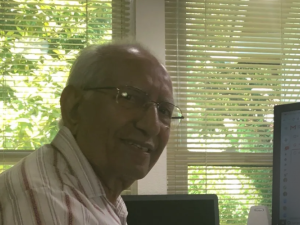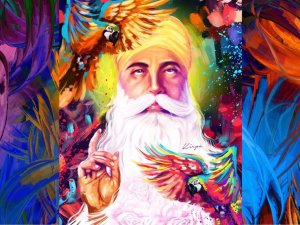Satbir Singh visited me in Texas in 1982 and spent a few days with me. Then, we met. after many years of pause. He stayed with me in Arlington to allow us time to reflect on our past. Then he reminded me of a two-week period we spent touring outside Punjab sometime during 1948. There were many moments together to solidify a few life objectives for ourselves. They triggered our drives in essentially a childish grandeur for re-writing Sikh history and elucidating Sikh theology in more contemporary idioms.
In our youth days, Satbir and I were pretty defiant of our Sikh scholars and Sikh politicians. The Sikh scholars were writing Sikh history on heresy evidence to please their masters; our clerics were defining Sikh theology to either fill their pockets or advertise their ignorance. It is then that Professor Sahib Singh inspired us with his writings on theology and Sirdar Kapur Singh with his outspoken criticism of political leadership. We were fortunate to spend hours with each of them and were determined to move their crusade further into many realms.
The 1948 idealism seemed somewhat childlike when we look back, but those thoughts still guided Satbir in his untiring efforts to write and write. He told me in 1982 that he was on his way to fulfilling his promise of 1948, but I was pretty negligent. I paused over his comments and said, "You have done so much and still plan to do so much more that nothing is left for me to do." He replied, "No, this was not so. My ability to communicate with the Western world is limited, and you ought to fill the vacuum." He expected me to have become fluent in Western idioms after migrating to America.
Although in my heart, I dismissed Satbir's expectation of me as wishful thinking, I promised him to make up to him on the writing projects he had outlined for me. The promise came from my love and respect for a dear friend and a colleague of many decades. In reality, it was not until I started thinking of retirement that I paid serious attention to my promise to Satbir.
When I was only a few years away from my retirement, I decided to write on Sikh subjects in English. After all, I was considered a very influential author in my youth when I wrote for vernacular papers in Punjab, such as Prabhat and Ajit, then published in Urdu. I even served as Assistant Editor of the Daily Parbhat with Dr. Jaswant Singh Neki as its Editor. I have published nearly 500 research papers in science and edited and written over two-dozen books on my medical research. Even I edited the Drug Development Research journal for 15 years. But still, I was afraid of popular writing on spirituality, history, or politics in English; those subjects were near to my heart, but I lacked the vocabulary that I needed to put my thoughts into writing for Western readers, whether Sikhs or others.
A reminder that built my confidence in my writing ability was that I was once paid an honorarium of $30 for my column published in a popular English newspaper from Washington, D.C. This was an essay on Guru Nanak, published in the Asian Student in 1956.
In 1956 when I arrived in the USA, my first celebration of Guru Nanak's birthday was going to be a lonely experience. It would be a sad day for me as I was used to witnessing large gatherings of my community each year on this day in India.
In desperation, I invited a few students for a lunch meeting in the University of Kansas Students' Union Cafeteria to celebrate my Guru's birthday. Then I also wrote a small article on Guru Nanak and mailed it to the Asian Student, a newspaper published to cater to the Asian international students enrolled in American universities. To my joyful surprise, not only was my essay published, but an honorarium of $30 arrived in the mail a few days later. The amount may seem meager in today's terms; it was nearly half of my monthly assistantship in those days.
Thus, reading and then writing were a hobby I chose in my retirement days. I realized that I would have to be dedicated and persistent until my writing in English improved. I am still working on that.
I am working out of chaos, as I did not get to organize my new filing system or clean my desk. Others used to do these chores for me until I changed my hobby after retiring from presiding over a sizeable academic enterprise.
I am starting to write with the understanding of my faith; I will add bits of my past life around my faith a bit later, fulfilling the desire of many friends. They seem to be eager to look into my past. It is not a bad idea to take things from daily life and view them as a distance from faith. It does not offend people and still exposes the hypocrisy in our beliefs. Sometimes by looking at our myths, we can help make sense of what wise men said.
I know that there is a need to explain my faith to my neighbors in Western societies, and it will offer an opportunity to clarify my thinking on many issues. As someone said, I believe that a writer's pen is more effective than a martyr's sword. I also read a quotation from Hoffer (1955) , who said, "The self-styled intellectual who is impotent with pen and ink hunger to write history with sword and blood."
I did start writing and publishing and invited my friends and colleagues to do the same. It is satisfying and it becomes a source of pleasure, believe me.





